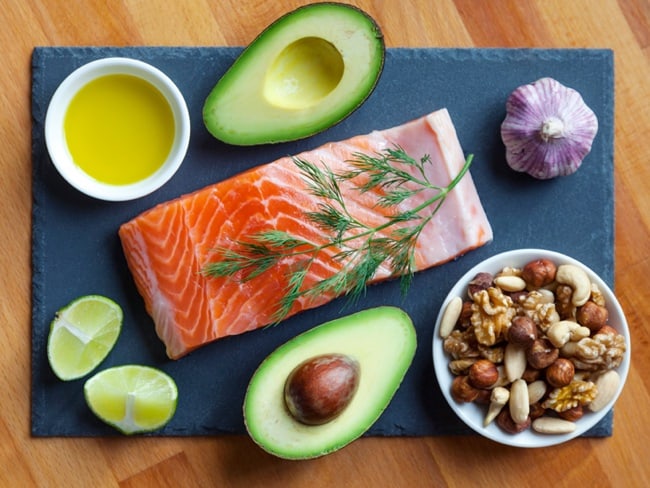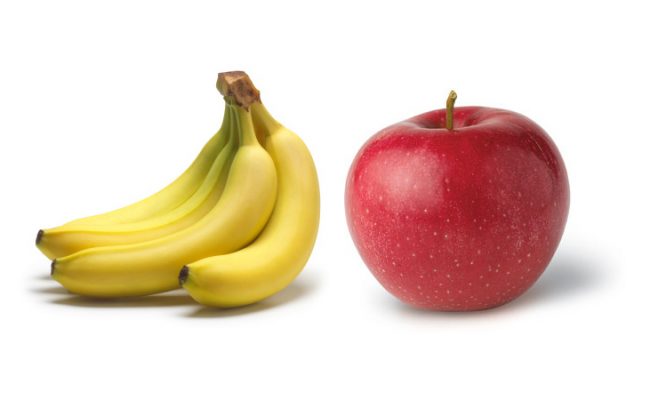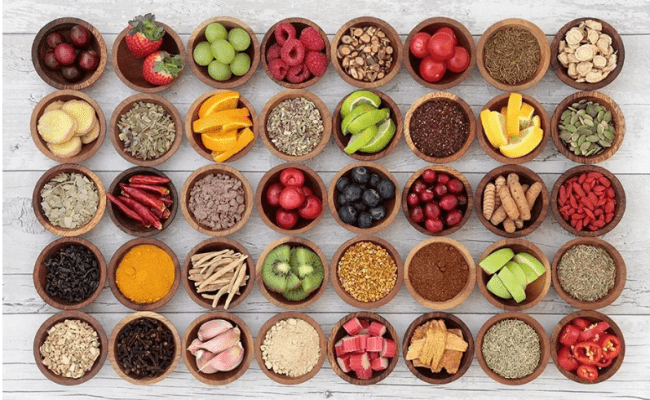
Cortisol is a hormone that cycles throughout out the day and is released under stress. Cortisol is naturally highest upon waking in the morning and slowly goes down throughout the day into the night. Cortisol helps keep us alert and also plays a role in breaking down fat and glycogen for energy.
It can also increase blood pressure, stimulate collagen synthesis and can increase water retention (1).
Cortisol is also increased during stressful events or in prolonged, intense exercise.
After stressful events or exercise, cortisol levels should go back down to normal.
If stress levels remain high, cortisol levels can also remain abnormally high.
Higher than normal cortisol levels can lead to negative side effects such as: weight gain, changes in metabolism, increased appetite, sleep disruption and increased risk for high blood pressure.
Trying to lower cortisol levels naturally can be advantageous for many reasons, but it could also benefit weight loss.
If following a lower calorie diet isn’t helping with weight loss, higher than normal cortisol levels may be a factor why weight loss isn’t happening.
Diet, exercise, sleep and relaxation techniques are all ways to naturally lower cortisol levels.
Balancing blood sugar, cutting processed food and eating more fruits and vegetables are some ways to lower cortisol naturally through diet.
How do high cortisol levels impact health?
It is quite common for people to feel stressed in their daily life.
In fact, it is estimated about 1 in 4 Americans rate their stress level at least an 8 on a scale from 1-10 (2).
Maintaining a high stress level can lead to unusually high cortisol levels. If cortisol levels remain elevated, appetite can increase and weight loss can be affected.
Animal studies have shown increased emotional or physical stress can increase high calorie food intake.
This response can be considered stress eating. You’re not eating because you’re hungry but because stress hormones may influence food choices and eating may be a way to try to lower stress.
Increased stress with higher than normal cortisol levels can also disrupt sleep and may increase alcohol intake in some people (3).
Lower processed foods, increase fruits and vegetables
Besides stress, diet has also been shown to have an influence on cortisol levels.
A 2016 review (4) suggests diets high in refined carbohydrates, salt, animal proteins and low intake of fruits and vegetables may increase risk for Alzheimer’s and may disrupt cortisol secretion.
Therefore, one way to naturally lower cortisol levels through diet is to cut down on refined carbohydrates found in white bread, packaged snacks, sugary cereals, sweets and sweetened beverages.
Eating more fruits and vegetables is recommended for numerous health benefits including helping to balance cortisol levels.
Fruits and vegetables are rich sources of antioxidants that protect cells from damage caused from free radicals and may offer anti-inflammatory benefit.
Packaged foods are a source of added sugar and salt.
Therefore, by lowering your intake of processed foods, you can help cut your intake of refined carbohydrates and salt: two of the nutrients associated with increasing risk for Alzheimer’s and cortisol regulation.
Make sure you’re eating enough, but not too much
With nearly two out of three adults in America considered overweight or obese, it may not be surprising that data from 2005 found about 47% of American adults were trying to lose weight at any given time (5).
A common practice for weight loss is to cut calorie intake with a diet.
However, with short term dieting, weight loss may happen but only temporarily. Weight gain can be common after someone goes off a diet.
A 2010 study (6) suggests sometimes dieting may not work for weight loss. Researchers found restricting calorie intake (1,200 calories per day) increased cortisol output.
Feeling stressed may increase appetite and cravings for high calorie foods. Eating too much food is not helpful for cortisol output either.
So, what is best: cut calories or eat what you want?
What may be a more helpful approach for weight and lowering cortisol is concentrating on eating plenty of the right kind of foods: fruits, vegetables, whole grains, legumes, nuts, seeds and lean proteins while limiting refined carbohydrates, processed foods and too much animal protein.
The 2010 study found monitoring calories increased perceived stress in research participants.
Therefore, focusing on eating the right types of food instead of a certain calorie goal may be helpful for weight loss and also lowering cortisol levels.
If you have questions about how much food is best for you, speak with a dietitian for further guidance.
Get your B vitamins
Some research suggests getting enough B vitamins may help have a positive effect on mood and stress (7).
Because of this, getting adequate B vitamin intake may in turn naturally help lower cortisol levels. Some, but not all, studies have shown supplementation with B vitamins may be associated with lower feelings of stress.
While more research is needed on B vitamin supplementation and cortisol levels, eating more foods high in B vitamins may add to efforts trying to lower cortisol levels.
Fruits, vegetables, legumes and whole grains are good sources of folate and vitamin B6.
Dairy, meats and other animal foods are good sources of vitamin B12, and vegetarian sources of B12 can include fortified grains or dairy alternatives.
Find stress relief
There are many health benefits from exercise including stress relief. Exercise releases feel good hormones which is why people feel can more relaxed after exercising.
Getting more movement could help you deal with stress which could ultimately help lower cortisol levels.
Intense exercise can elevate cortisol levels, but lower intensity exercise may help lower cortisol.
Therefore, low to moderate cardio exercise may be best for helping to lower cortisol levels (8).
In fact, exercising too much can have the opposite effect. Athletes who over train have elevated levels of cortisol.
Whether it is exercise, spending time outside, reading, etc. including activities in your life that help lower stress are important for countering all the stress we can face in daily life.
Eating more fruits, vegetables and less processed foods can help lower cortisol, but adding stress relieving activities can also help to naturally lower cortisol levels.










